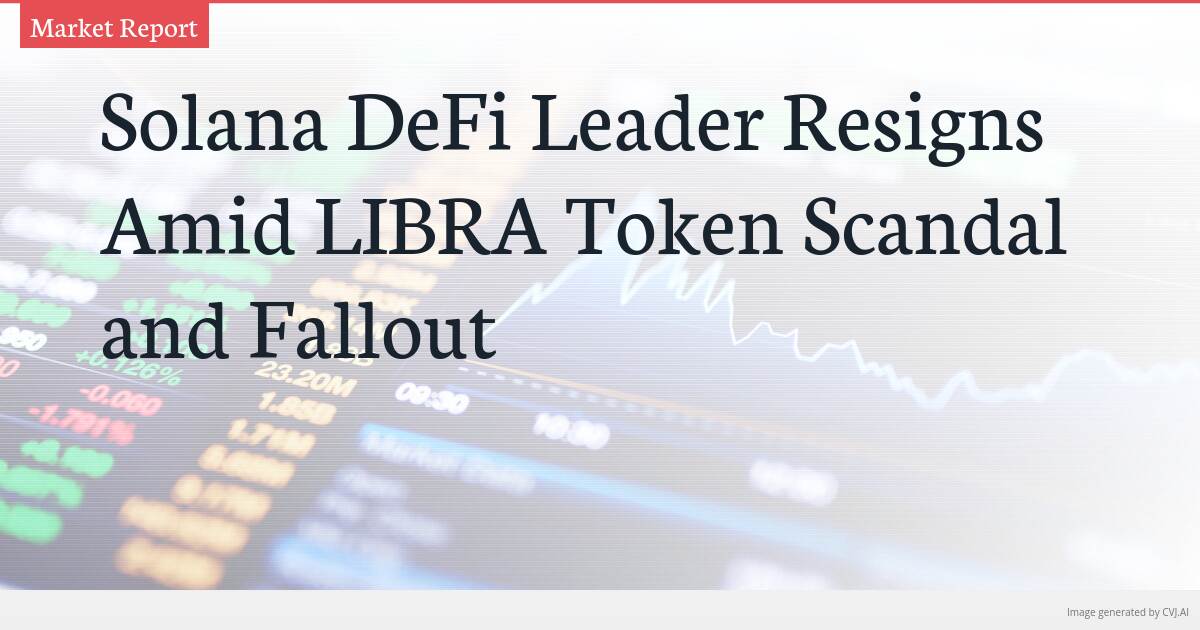This summary text is fully AI-generated and may therefore contain errors or be incomplete.
In a notable event within the decentralized finance (DeFi) sector, significant changes have occurred that have raised concerns about integrity and trust. These developments involve key figures and protocols that are shaping the landscape of DeFi, highlighting both challenges and advancements in the industry.
Ben Chow Resigns from Meteora Protocol
Ben Chow, co-founder of the Meteora protocol, has stepped down following his involvement in the controversial LIBRA token scandal. This incident has caused significant disruption within the Solana ecosystem, particularly concerning a $4.5 billion pump-and-dump scheme that has attracted attention from both investors and regulators.
Chow’s resignation follows allegations of his connection to Hayden Davis, a crypto promoter who admitted to front-running the LIBRA token and profiting at the expense of unsuspecting investors. Chow has publicly distanced himself from the scandal, claiming that neither he nor the Meteora team compromised the LIBRA launch by leaking information or managing any tokens.
- His resignation was prompted by a leaked conversation in which he was confronted about possible collusion with Davis to manipulate memecoin launches.
- The repercussions of this incident have raised concerns about the integrity of DeFi protocols.
- There are ongoing discussions about the responsibilities of leaders in ensuring transparency and trust within the community.
The LIBRA token, which was promoted by Argentine President Javier Milei, saw a rapid increase to a market value of $4.5 billion before experiencing a decline of over 95%. This dramatic fluctuation has underscored the risks associated with memecoins and the potential for market manipulation. Chow’s exit from Meteora is viewed as a necessary measure to restore credibility to the protocol, which aims to assist users in launching and providing liquidity for new memecoins.
Railgun Protocol’s Commitment to On-Chain Privacy
In a separate but equally important development, the Railgun protocol has showcased its commitment to on-chain privacy while preventing criminal activity. Following a $9.5 million hack of the ZkLend lending protocol on the Starknet blockchain, the hacker attempted to transfer the stolen funds to the Ethereum blockchain using Railgun, which is designed to obscure transaction traceability.
However, Railgun’s security measures successfully thwarted the hacker’s attempts, demonstrating the protocol’s ability to maintain integrity in the face of illicit activities. Railgun’s co-founder explained that the protocol enables DeFi security experts to flag criminal crypto addresses, which is crucial for maintaining a secure environment.
- Once an address is identified as linked to illicit activities, Railgun restricts its access to privacy features.
- This effectively prevents the hacker from further moving the stolen funds.
- The incident highlights the importance of robust security measures in the DeFi space.
As the industry faces increasing instances of hacking and fraud, Railgun’s proactive approach not only protects users but also reinforces the idea that privacy protocols can be designed to deter criminal behavior. Balancing privacy and security will remain a critical focus for developers and users alike as the DeFi landscape evolves.
World Liberty Financial’s Strategic Reserve Initiative
In a move signaling growing institutional interest in the cryptocurrency market, World Liberty Financial, a DeFi protocol backed by former President Donald Trump, has announced plans to create a strategic reserve of digital assets. This initiative, named Macro Strategy, aims to support leading projects such as Bitcoin and Ethereum while exploring emerging DeFi opportunities.
The announcement comes amid a broader trend of traditional financial institutions increasingly engaging with the crypto space. A co-founder of World Liberty emphasized that the on-chain stockpile will reflect the company’s commitment to the cryptocurrency industry.
- However, the specifics of how this reserve will be managed remain unclear.
- World Liberty has a history of not being a long-term holder of its crypto assets.
- The company has previously engaged in token swap deals with various crypto teams.
As the DeFi sector matures, the establishment of strategic reserves by companies like World Liberty could pave the way for greater legitimacy and stability within the market. This development reflects a growing recognition of the potential for digital assets to play a significant role in the future of finance, as well as the need for responsible management of these assets to foster investor confidence.
📎 Read the original article on dlnews.com


